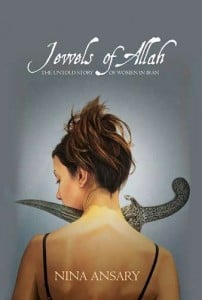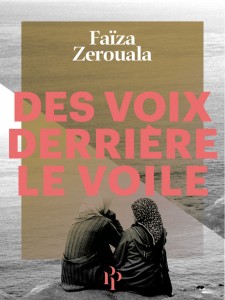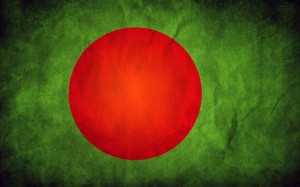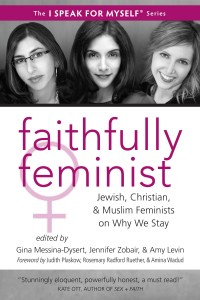Who says young adult fiction about Muslim girls can only be contemporary or historical? Nnedi Okorafor-Mbachu’s 2007 novel shows that Muslim teen lit can venture into the realm of the future. Young adult novel The Shadow Speaker explores science fiction and fantasy with a story that plays out in a futuristic, magical universe with worlds beyond Earth. It does so starring a Muslim protagonist, 14- to 15-year-old Ejii Ugabe.

In Ejji’s world, it is 2070. And instead of a futuristic Britain or America, Ejii lives in Niger. She is black, but this is not a “race novel.” English is but one of the many languages she speaks, which include the more useful Hausa and Arabic. Ejii lives in a world post-“Peace Bomb.” Nuclear war led to the release of these bombs, which aimed to spread peace by causing mutations in the human population. (The goal to make people so different they wouldn’t be able to unite against each other.) What the bombs did was release magic into the world. This is a world of desert magicians, screaming storms that intend to kill lone travelers, and talking camels. And Ejii, as a “shadow speaker,” has a special talent: She can tap into the thoughts of feelings of anything or anyone, from plants to murderous chiefs.
Okorafor-Mbachu describes Ejii’s adventures as she sets out to develop her talent and stop the impending war between Earth and the plant-based Ginen. It’s an interesting mix between old and new. Ejii and her friends use a technological device called the elegba to communicate with each other, write essays, and research information. At the same time, Ejii travels by camel and occasionally wears a burqa.
Similarly, there are contrary portrayals of Islam. Ejii’s father, described as so terrible that he had to be publicly beheaded in a display of vigilante justice, brought “changes” to Ejii’s town, long before Ejii’s story takes place. Ejii describes the change, which seems to be an “Islamification” of the town:
He returned a month later a changed man. He rode into town on a bejeweled camel, wearing a golden caftan and turban and an equally golden smile. […] When Kwàmfà was Jaa’s town, everyone learned how to shoot a gun, ride a camel, take apart and rebuild a computer. Girls and women with meta-abilities were allowed to hone their skills and learn from elders. My father put an end to all of this.
‘Women and girls are too beautiful to dirty their hands with such things,’ he told the people with a soft chuckle. The men would agree and the women and girls would feel flattered and demurely smile. My father also thought women and girls too beautiful to be seen, so he brought back and enforced the requirement of wearing a burka or veil at all times. And he cut off several food and housing programs, which left many people very poor. (12-13)
Although the author — who herself is not Muslim — never specifies that these changes are due to Ejii’s father’s Muslimness, she draws a connection between Islam and the conservative dress not native to the region (as of 2009, anyway). When Ejii visits Agadez, which is an “old Muslim city full of people, from Arab to African,” she drapes a veil over her head to blend in with the “many women wearing veils and burkas.” (161)
Ejii’s dress varies. Sometimes she wears a full-body veil — sometimes to blend in, sometimes to avoid recognition. Sometimes she throws it off for the dress underneath. Jaa, the strong female leader who killed Ejii’s father and serves as a sort of mentor to Ejii, opposes the burqa and tears it off Ejii. It is associated with the other changes brought about by her father: namely, the subordination of women.
Throughout the novel, Ejii struggles to overcome the submissive behaviors she has learned. When her mother tells Ejii that she shouldn’t walk behind her male friends, she makes a conscious effort to not step behind when walking with males.
But while Islam is associated with the repressive measures it is also associated with today, Ejii sees Islam wholly positively. In fact, she tells Jaa’s mother-in-law, “My father believed in a religion called Islam. But he wasn’t a good Muslim.”
Just as Okorafor-Mbachu weaves fantastical creatures and talents into the story, she incorporates the everyday-ness of Islam into Ejii’s life. Ejii is described as praying:
That night as Ejii closed the door to her room, took off her shoes, spread her cover on the floor, knelt down, and prayed, she felt wonderfully close to Allah.
And not praying:
Outside, the morning prayer blared through the streets and Ejii felt a pang of guilt. The last few days had been so hectic that she hadn’t kept up with her prayers.
Ejii make references to “Allah,” and it’s clear that Allah is not portrayed as an “Islamic God” but a force that transcends description. In a fantastical, deeply spiritual forest, Ejii “join[s] with what she could only call Allah” (236).
Some aspects of Ejii’s Islam may be troubling to Muslim readers not of post-Peace Bomb 2070. For example, the first time in the novel Ejii prays is perhaps not be quite “halal”:
Ejii knelt on the ground, pressed her head to the sand, and said a prayer to all the gods and goddesses she could think of.
What are these gods and goddesses? Why aren’t her prayers to “what she could only call Allah”? Such questions are not answered.
Additionally, Islam of 2070 seems to have no prohibitions on alcohol. Consider this passage:
‘What would you like to drink?’ her mother asked Mazi Godwin.
‘Beer would be fine,’ he said. ‘And give my student here [Ejii] a glass of palm wine to calm her down.’
Characters established as Muslim drink alcohol with no indication that there is anything un-Islamic about it. Perhaps this is just part of Okorafor-Mbachu’s fantasy world. However, this rather liberal take on alcohol stands out in a society in which burqas are common.
The book is engaging and creative. Okorafor-Mbachu develops a complex and detailed world and her vision of a futuristic Africa sprinkled in magic is fascinating. Her break out of the traditional setting for science fiction and fantasy is refreshing. Interesting too is her take on Islam. A mix of positive and negative, Islam is both a source of strength and a source of not-so-great treatment of women. Tradition is both upheld and challenged: burqas and palm wine coexist peacefully. The Shadow Speaker is definitely not the next Does My Head Look Big in This?, but it’s worth a read for anyone looking for a good story featuring a strong female protagonist who is Muslim.
More on the book at the author’s website.











